Unit 1 The Changing WorldTopic 1
第一次月考英语知识点
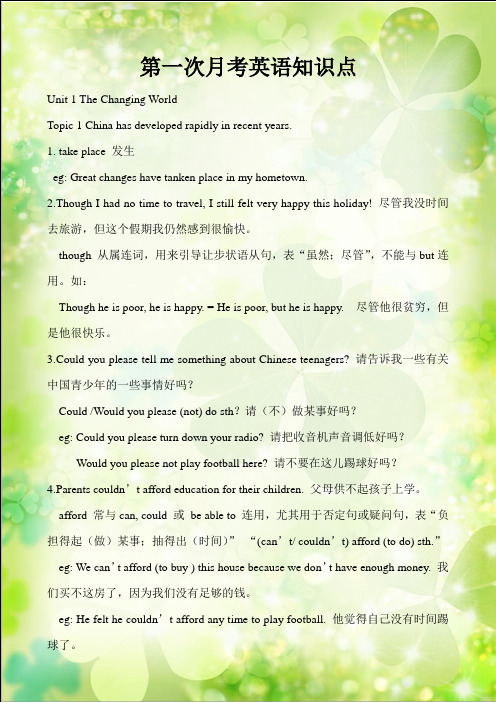
第一次月考英语知识点Unit 1 The Changing WorldTopic 1 China has developed rapidly in recent years.1. take place 发生eg: Great changes have tanken place in my hometown.2.Though I had no time to travel, I still felt very happy this holiday! 尽管我没时间去旅游,但这个假期我仍然感到很愉快。
though 从属连词,用来引导让步状语从句,表“虽然;尽管”,不能与but连用。
如:Though he is poor, he is happy. = He is poor, but he is happy. 尽管他很贫穷,但是他很快乐。
3.Could you please tell me something about Chinese teenagers? 请告诉我一些有关中国青少年的一些事情好吗?Could /Would you please (not) do sth?请(不)做某事好吗?eg: Could you please turn down your radio? 请把收音机声音调低好吗?Would you please not play football here? 请不要在这儿踢球好吗?4.Parents couldn’t afford education for their children. 父母供不起孩子上学。
afford 常与can, could 或be able to 连用,尤其用于否定句或疑问句,表“负担得起(做)某事;抽得出(时间)”“(can’t/ couldn’t) afford (to do) sth.”eg: We can’t afford (to buy ) this house because we don’t have enough money. 我们买不这房了,因为我们没有足够的钱。
Unit 1 The Changing World Topic1

Unit 1 The Changing WorldTopic 1 Our country has developed rapidly.目标预览知识目标1.重点词汇和短语Proper ,bell,grandpa,chairwoman, grandson, shut,rope,granny,describe,education,develope Communication,quick,sort, rapid,consider….2.语法:(1)have /has been to 和have /has gone to的用法与区别;(2)初步学习现在完成时。
3重点句型及交际用语:(1)Rita,you have just come back from your hometown.(2)--where have you been, Jane?--I have beento Shanghai with my parets.( 3)She has gone to Cuba to be a volunteer activities.(4)There goes the bell.(5)Ihaven’t seen him for a long time.……任务型学习目标1.掌握现在完成时的构成及其用法,并学会用have /has been to 和have /has gone to 的用法2.通过对过去生活和现在生活的对比,学会珍惜现有生活,努力学习,创造美好的未来。
课时安排:五课时Section AThe main activity is 1a. 本课重点活动是1a。
Ⅰ. Teaching aims and demands 教学目标1. Learn some new words and a phrase:proper, by the way, bell, grandpa, chairwoman, grandson2. Learn a useful sentence:There goes the bell.3. Learn the present perfect tense:(1)Rita, you have just come back from yourhometown.(2)—Where have you been, Jane?—I have been to Mount Huang with my parents.(3)—By the way, where’s Maria?—She has gone to Cuba to be a volunteer…4. Talk about the children’s vacation experiences.Ⅱ. Teaching aids 教具录音机/小黑板/学生的旅游纪念照/图片/幻灯片Ⅲ. Five-finger Teaching Plan 五指教学方案Step 1 Review 第一步复习(时间:7分钟)通过教师询问学生的暑期活动,导入话题,呈现部分生词。
Unit1 topic 1知识点总结
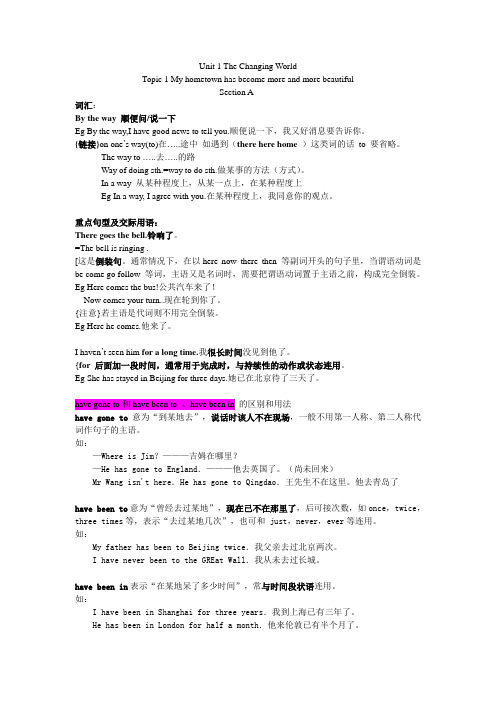
Unit 1 The Changing WorldTopic 1 My hometown has become more and more beautifulSection A词汇:By the way 顺便问/说一下Eg By the way,I have good news to tell you.顺便说一下,我又好消息要告诉你。
{链接}on one’s way(to)在…..途中如遇到(there here home )这类词的话to 要省略。
The way to …..去…..的路Way of doing sth.=way to do sth.做某事的方法(方式)。
In a way 从某种程度上,从某一点上,在某种程度上Eg In a way, I agree with you.在某种程度上,我同意你的观点。
重点句型及交际用语:There goes the bell.铃响了。
=The bell is ringing .[这是倒装句。
通常情况下,在以here now there then 等副词开头的句子里,当谓语动词是be come go follow 等词,主语又是名词时,需要把谓语动词置于主语之前,构成完全倒装。
Eg Here comes the bus!公共汽车来了!Now comes your turn..现在轮到你了。
{注意}若主语是代词则不用完全倒装。
Eg Here he comes.他来了。
I haven’t seen him for a long time.我很长时间没见到他了。
{for 后面加一段时间,通常用于完成时,与持续性的动作或状态连用。
Eg She has stayed in Beijing for three days.她已在北京待了三天了。
have gone to和have been to 、have been in 的区别和用法have gone to意为“到某地去”,说话时该人不在现场,一般不用第一人称、第二人称代词作句子的主语。
[精品课件]九年级英语上册 Unit 1 The Changing World Topic 1 Our country has developed rapidly Secti
![[精品课件]九年级英语上册 Unit 1 The Changing World Topic 1 Our country has developed rapidly Secti](https://img.taocdn.com/s3/m/b6acfa2fe87101f69f319514.png)
Task 2
Read for details
Unit 1 Topic 1 Section C
Have you heard of the song Seasons In The Sun ?
We’ve known each other since we were nine or ten. Together we’ve climbed hills and trees.
develop _d_e_v_e_l_o_p_e_d__ _d_e_v_e_lo_p_e_d__
succeed _s_u_c_c_e_e_d_e_d__ _s_u_c_c_e_e_d_e_d__
Let’s enjoy some old pictures of Fuling.
Some pictures of new Fuling.
Read Paragraph 2 and , using key words.
Items
The old city
The new city
Roads Houses
Read Paragraph 2 and 3
Items
The old city
3. At the end of class, everyone d_r_e_a_m_t_ _/d_r_e_a_m_e_d__a_b_o_ut__t_h_e_f_u_t_u_r_e(梦想未来).
A mind map
九年级英语上册 Unit 1 The Changing World Topic 1 Our country has developed rapidly Section D课件 (

abroad adv. 在国外,到国外
go abroad 去国外
at home and abroad 国内外
13
1b Read 1a and answer the following questions.
1. When do people usually have their leisure activities?
10
Retell 1a according to the table.
1. Leisure activities play an important part in people’s lives. 休闲活动在人们的生活中起着重要的作用。
play a/an… part = play a/an… role
A. Many. B. Little. C. None. D. Few.
2. Kids often got together to ______.
A. play cards
B. listen to the radio
C. play hide-and-sEeevkaluaDti.opnlayognalym.es on computers
To help others makes us happy. make sb./sth. + adj.
make sb./sth. do sth. I think it is important to remember the past, live
in the present and dream about the future.
B. Because they have time and chance.
C. Because they don’t want to work.
仁爱版英语九年级上册unit 1知识点+短语

Unit 1 The Changing WorldTopic 1 China has developed rapidly in recent years.一、重点词汇(一) 词形转换1.training (动词) train“训练”2.whole (同音词) hole3.tidy (近义词) clean4.develop (名词) development(形容词)developed“发达的”; developing“发展中的”5.rapid (副词) rapidly6.old (比较级) older; elder7.recent (副词) recently8.narrow (反义词) wide9.title (近义词) subject(二)重点短语1.have a good summer holiday过一个愉快的暑假e back from…从……回来3.work for …为……工作4.feel sorry for…对……深表同情5. a disabled children’s home一家残疾儿童养育院6.the whole holiday整个假期7.tell stories to kids给小孩讲故事8.learn…from从……当中学习9.feed a child喂小孩10.do farm work干农活11.go to summer classes上暑期班12.write an article about…写一篇有关……的文章13.have a hard/ happy life过着艰苦的/ 幸福的生活14.in the past/ future在过去/ 在将来15.in detail详细地16.at sunrise在日出时17.have no chance to do sth.没有机会做某事18.afford ( to do) sth担负得起(做)某事19.give support to sb.给某人帮助/支持20.get a good education获得良好的教育21.search…for…为了……搜索……22.have little food to eat吃不饱23.dress warmly穿得暖24.with the development of…随着……的发展25.have a balanced diet饮食均衡26.play musical instruments演奏乐器27.sleep in the open air在户外睡觉28.study/ go abroad在国外学习/ 出国29.enter/ win/ lose a competition参加/ 赢得/ 输掉比赛30.enjoy Beijing Opera欣赏京剧ed to do sth.过去常做某事32.at sunrise在日出时33.go hungry变饿了34.fall ill得病/ 患病35.divide …into…把……分成……36.feel satisfied with…对……感到满足37.see …. oneself 亲眼看见……38.make progress取得进步39.thanks to多亏; 幸亏;由于40.stand for代表41.with the help of…在……的帮助下42.draw up an outline拟定提纲三、重点句型1.You have just come back from your hometown. 你刚刚从你的家乡返回。
仁爱英语九上知识点总结

Unit 1 The Changing WorldTopic1 Our country has developed rapidly1.重点短语:我的家乡发生了巨大的变化Great changes have taken place in my hometown.与汉语语序不同.可不可以变为My hometown has taken place great changes?答:不能,因为take place 是不及物动词,不能接宾语,而my hometown不是动作发出者,不能作主语,应作地点状语.Happen 也是不及物动词考考你:昨天这里发生了一场交通事故。
Yesterday a traffic accident happened here.(1)Take place与happen的区别Take place(尤指根据安排或计划)发生,进行Eg:Great changes will take place in this town in the near future.Happen(尤指偶然)发生,出现Eg: The traffic accident happened last Friday.拓展:take the place of sb/sth= take sb’s/sth’s place 代替Eg: I have to find someone to take Jenny’s place。
She’s badly ill。
(2)have/has been to 与have/has gone to的区别(不能与表示一段时间的时间状语连用)have/has been to some place“去过某地,现在人已返回"eg: ———Where have you been, Jane?———I have been to Beijing with my parents。
have/has gone to some place“去了某地,可能在某地或者去某地的路上,总之不在说话现场" eg:---Where is your father?--—He has gone to London。
仁爱版初中英语九年级上册unit 1 the changing world知识点归纳
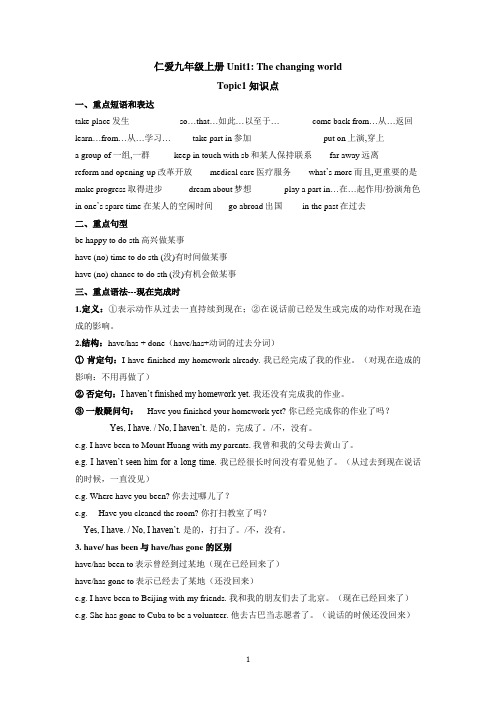
仁爱九年级上册Unit1: The changing worldTopic1 知识点一、重点短语和表达take place发生 so…that…如此…以至于… come back from…从…返回learn…from…从…学习… take part in参加 put on上演,穿上a group of一组,一群 keep in touch with sb和某人保持联系 far away远离reform and opening-up改革开放 medical care医疗服务 what’s more而且,更重要的是make progress取得进步 dream about梦想 play a part in…在…起作用/扮演角色in one’s spare time在某人的空闲时间 go abroad出国 in the past在过去二、重点句型be happy to do sth高兴做某事have (no) time to do sth (没)有时间做某事have (no) chance to do sth (没)有机会做某事三、重点语法---现在完成时1.定义:①表示动作从过去一直持续到现在;②在说话前已经发生或完成的动作对现在造成的影响。
2.结构:have/has + done(have/has+动词的过去分词)①肯定句:I have finished my homework already. 我已经完成了我的作业。
(对现在造成的影响:不用再做了)②否定句:I haven’t finished my homework yet. 我还没有完成我的作业。
③一般疑问句:---Have you finished your homework yet? 你已经完成你的作业了吗?---Yes, I have. / No, I haven’t. 是的,完成了。
/不,没有。
e.g. I have been to Mount Huang with my parents. 我曾和我的父母去黄山了。
九年级英语上册 Unit 1 The Changing World Topic 1 Our coun

Homework
1. Read 1a aloud.
2. Make sentences with have/has gone to... and have/has been to... 3. Finish Section A in your workbook. 4. Preview Section B.
Jane
Kangkang
Maria
and she will be back tomorrow ___________
1c Retell the main information of 1a based on 1b.
Key phrases and expressions:
How was your trip? 1. 你的旅行如何? _________________
THANK YOU!
A. has been to
C. have been to
B. has gone to
D. goes to
A 2. Great changes ______ in my hometown.
A. have taken place
C. have happened
B. take place
D. happened
1b Listen to 1a and complete the table.
places near many _______ India the home in ______ Mount ________ Huang has been to with her _________ parents summer an English _______ school Cuba to be a ______ has gone to volunteer
仁爱版九年级英语上Unit one The Changing world Topic 1 Our country has developed rapidly Section A
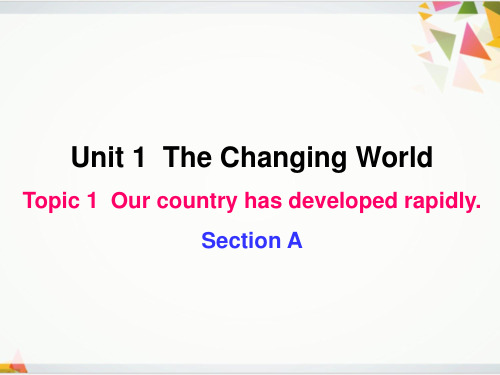
Mount Huustralia Africa London America
2a TLhisetennetoxtthedcaoyn,vMersaartiiaoncaanmd feillbinatchke .blSanhkes.mTheetn practice it withMyoicurhpaaertlneirn. the school.
I __h_a_v_e_f_in_i_s_h_e_d_ my English homework. 她已做好了晚饭。 Sheh_a_s__c_o_o_k_e_d the dinner.
Read these aloud:大声读、背(准备默写) 1.从、、回来: come back from…. 2. 发生: take place 3.如此多的人: so many people 4.如此多的钱: so much money 5.找到一个好地方: find a good place 6. 提高我的英语: improve my English 7.去过某地: have/has been to sw 8.去了某地: have/has gone to sw 9. 顺便提一下:by the way 10. 铃声响了: There goes the bell.
Read 1a by yourselves again.
1a Listen,look and say.
Can you find out the following sentences and
understand them? 1.You have just come back from your hometown.
1.他们去过上海。Thheya_v_e_ b_e_e_ n__toShanghai. 2.她去了上海。She _h_a_s_ g__o_n_e_t_o__Shanghai.
Unit 1 The Changing World

Unit 1 The Changing WorldTopic 1 China has developed rapidly in recent years.一、重点词汇(一)词形转换1. training (动词) train“训练”2. whole (同音词) hole3. shut (同义词) close4. develop (名词) development(形容词)developed “发达的”; developing“发展中的”5. rapid (副词) rapidly6. old (比较级) older; elder7. recent (副词) recently8. narrow (反义词) wide9. satisfy (动词)satisfied (形容词) satisfaction (名词)10. communication(名词) communicate (动词)(二)重点短语1.h ave a good summer holiday2.c ome back from…3.I t must be fun.4.t ake part in some volunteer activities5.a disabled children’s home6.W hat a wonderful experience!7.learn…from8.have no time to do sth.9.p ut on funny shows10.do something useful11.see the changes in Beijing herself12.in the 1960s13.be crowded into small houses14.have a hard/ happy life15.get enough food16.have no chance to do sth.17.had little money to see a doctor18.keep in touch with... only by letter or telegram19.get a good education20.satisfy people’s needs21.enjoy good medical care22.make rapid progress23.succeed in doing sth.= be successful in doing sth24.live in the present25.in the past/future26.play an impotant part in27.play hide-and-seek28.play cards /chess29.various kinds of leisure activities30.chat on the Internet31.In recent years32.go to visit some places of interest33.make a tour abroad三、重点句型1.You have just come back from your hometown. 你刚刚从你的家乡返回。
九年级英语上册 Unit 1 The Changing World Topic 1 O

Unit1 Topic1 重点句子解析【1】There goes the bell.铃响了。
(教材P1)这是一个完全倒装句,当主语是名词时,要把主语放在谓语动词之后。
如:Here comes the bus.车来了。
当主语是代词时用局部倒装句,即把主语放在谓语动词之前。
如:.Here they are.他们在这。
Here they come.他们来了。
【2】I was a volunteer in a disabled children’s home.我曾是残疾儿童之家的一名志愿者。
(教材P3)disabled 意为“残疾的,残废的”。
如:The shop sells all kinds of facilities for disabled people.这家商店卖各种各样的残疾人使用的设施。
【拓展】disable 意为“使丧失能力,使伤残”。
如:He was disabled in a car accident.在一场车祸中他变残疾了。
【3】Though I had no time to travel, I still felt very happy. 虽然我没有时间去旅行,但是我仍然感到很开心。
(教材P3)1)though/although为连词,意为“虽然,尽管,即使'引导让步状语从句,不能与but连用。
如: Though/Although my son is only nine years old, he knows a lot.虽然我的儿子只有九岁,但是他懂得很多。
2) have no time to do sth.意为”没有时间做某事”。
动词不定式在句中作定语修饰time。
如:I have no time to have breakfast.我没有时间吃早饭了。
She has no time to wait for you.她没有时间等你了。
【4】To help others makes us happy.帮助别人让我感到开心。
Unit 1 The Changing World Topic 1课件仁爱版九年级英语上册

Key points
Read, study and learn about everything imporant in your life
2. But there were so many people that I couldn’t find a proper place to take
3K. Tehyerepgooeins tthse bell.
思考:这是个there提前引起的___倒__装_____句 回忆:副词here, there 提前到句首要引起主谓倒装,但是当主语为人称 代词时不倒装。 练习:a. Here comes the No.31 Bus. 译:3_1_号__公__交__车__来__了__。__
B: He _h_a_s___ _g_o_n__e_ to Beijing.
I have been to Mount Huang with my parents.
Oh, she has gone to the library.
Read, study and learn about everything imporant in your life
现在完成时: have/has + 过去分词
Mount Huang
Cuba
Australia
Africa
the Great Wall Hangzhou
London America
Work in groups and make the similar
dialogs.
Read, study and learn about everything imporant in your life
Unit 1 知识点复习 仁爱版英语九年级上册

单元知识点总结Name:_____________Unit 1 The changing worldTopic 1 our country has developed rapidly.Section A1.Kangkang is happy to see his friends.【知识点】be happy to=be glad to do sth. 做某事很开心2.There were so many people that I couldn’t find a good place to take photos.Mr. Brown is such a kind teacher that well like him.(U1T2SA)【知识点】如此...以至于:so....that; such...that【用法】so+adj./adv.+that+句子; such+(a/an)+adj.+n.+that+句子【注】当名词前有“many/much/few/little”时,要用so...that,即:so+many/much/few/little+n.+that+其它3.There goes the bell.【知识点】倒装句So do I.(U1T2SA)【知识点】倒装句,译为“我也是”So+助/情/Be+主。
;【否】neither/nor++助/情/Be+主。
Section B4.You took part in some volunteer activities during the summer holidays, didn’t you?【知识点】反意疑问句:【原则】前肯后否;前否后肯5.1)What a wonderful experience! 2)How interesting!【知识点1】experience:n. 经历(可数);经验(不可数)【知识点2】感叹句:what+(a/an)+adj.+n.(+主+谓)!how+adj./adv.+(+主+谓)!6.I think it makes me happy to help others.【知识点1】宾语从句:【识别】V+句子【知识点2】it makes sb.+adj.+to do sth. 做某个事使某人....7.Though I had no time to travel, I still felt very happy.【知识点1】though/although引导让步状语从句。
科普仁爱英语九上《Unit 1 The Changing WorldTopic1 Our country has developed rapidly Section D》
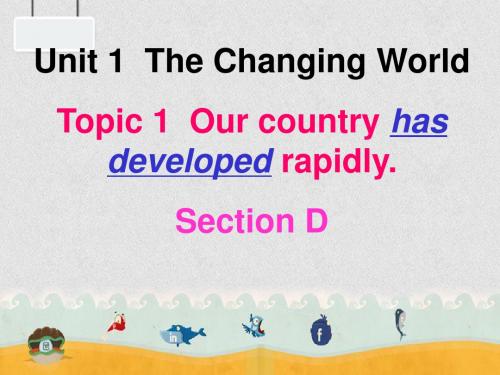
play games computers
on 在电脑上玩游戏
不要玩太多电脑游戏。
Don't play too many games on computers.
chat on the Internet
在互联网上聊天
make a tour abroad 到国外旅游
在过去抓泥鳅是 我们的休闲活动之一
P7 Changing Leisure Activities
改变中空闲活动
What are leisure activities?
Leisure activities are the kinds of things people like to do to relax and enjoy themselves when they are not working or going to school.
watch operas
看戏剧
在20世纪80年代 看戏剧是很有趣的事情。
It ‘s great fun to watch operas in 1980s.
listen to the radio
听收音机
At present 目前
since the reform and opening-up.
自从
play cards
打牌
我有时候喜欢和我的家人打牌。
Sometimes I like playing cards with my families.
play chess
下象棋
我有空的时候就和 爸爸下棋。
I play chess with my father when I am free /in my spare time.
- 1、下载文档前请自行甄别文档内容的完整性,平台不提供额外的编辑、内容补充、找答案等附加服务。
- 2、"仅部分预览"的文档,不可在线预览部分如存在完整性等问题,可反馈申请退款(可完整预览的文档不适用该条件!)。
- 3、如文档侵犯您的权益,请联系客服反馈,我们会尽快为您处理(人工客服工作时间:9:00-18:30)。
Unit 1 The Changing World
Topic 1 Our country has developed rapidly.
Section A
The main activity is 1a.
Ⅰ. Teaching aims and demands
1. Learn some new words and a phrase:
proper, by the way, bell, grandpa, chairwoman, grandson
2. Learn a useful sentence:
There goes the bell.
3. Learn the present perfect tense:
4. Talk about the children’s vacation experiences.
Ⅱ. Teaching aids
录音机/小黑板/学生的旅游纪念照/图片/幻灯片
Ⅲ. Five-finger Teaching Plan
Step 1 Review (时间:5分钟)
通过教师询问学生的暑期活动,导入话题,呈现部分生词。
T: Listen! The bell is ringing. Let’s begin our class! (教师解释The bell is ringing等于There goes the bell,板书bell,要求学生掌握。
)(同样的引导学生学习并掌握grandpa和proper)
T: O K, you all had a good summer holiday. What about Kangkang and his friends? Let’s come to the new unit now.
Step 2 Presentation (时间:12分钟)
创设语言情境,呈现have/has been to和have/has gone to及部分生词。
1. (创设对话情境。
Mr. Smith星期六组织Class 2去野营,大家在校门口集合时发现Jim没来。
师生对话,呈现have/has gone to…)
(Jim has gone to Beijing to be a volunteer.板书并让学生了解volunteer,教师适当讲解have/has gone to的用法,并让学生初步掌握。
)
(假设星期一Jim返回学校,Mr. Smith和Jim展开对话,呈现have/has been to。
)(板书并适当讲解,要求学生初步掌握。
)
(教师可用简笔画呈现have/has been to和have/has gone to,讲解它们的区别并要求学生掌握。
)
2. (师生对话,简单操练have/has been to和have/has gone to的用法。
)
3. (播放1a录音,回答小黑板上呈现的问题。
以听力的形式呈现1a的主要内容。
)
T: Now, listen to 1a. Kangkang and his friends are talking about their different experiences during the holiday.
Answer the following questions on the small blackboard:
(出示小黑板。
)
(1) Who has just come back from India?
(2) Where has Jane been?
(3) Where has Kangkang been?
(4) Who isn’t at school?
4. (重放1a录音,总结重点句型并板书。
)
T: Listen to the tape again. Then talk about what they have done.
Rita has just come back from India. She has been to …
Jane has been to … Kangkang has been to …
Maria isn’t at school. She has gone to …
Step 3 Consolidation (时间:10分钟)
巩固1a,完成1b,并引导学生区别一般过去时与现在完成时。
1. (让学生分角色读对话,教师巡视并纠正学生发音。
)
2. (学生独立完成1b的表格。
师生共同核对答案,巩固现在完成时have / has been/gone to这一基本句型。
)
3. (由1a对话引导学生谈论暑期生活,继续巩固现在完成时。
)
(学生三人一组进行问答。
)
(挑几组学生进行表演,并对学生进行适时指导和鼓励。
)
(教师引导学生区别一般过去时与现在完成时。
)
Step 4 Practice (时间:8分钟)
完成1c和2,强化练习现在完成时及部分重要词汇。
1. (教师让学生两人一组,每人拿出提前准备好的旅游照片或图片,操练现在完成时。
注意区别一般过去时、
一般将来时和现在完成时,完成1c。
)
2. (根据呈现的have/has been to和have/has gone to,完成2。
然后核对答案。
在处理2时,板书并讲解,要
求学生掌握chairwoman和grandson。
)
Step 5 Project (时间:5分钟)
让学生完成暑期调查表格,并写出调查报告,进一步熟练运用现在完成时。
(教师制作关于暑假活动的表格,让学生通过对话完成表格。
)
Homework: Make two sentences using have/ has been to , have / has gone to
Ⅳ.板书设计:
Our country has developed rapidly.
Section A
by the way —Where have you been, Jane?
There goes the bell. —I have been to …
proper Maria isn’t at school. Where’s she?
chairwoman —She has gone to …
教学反思:。
